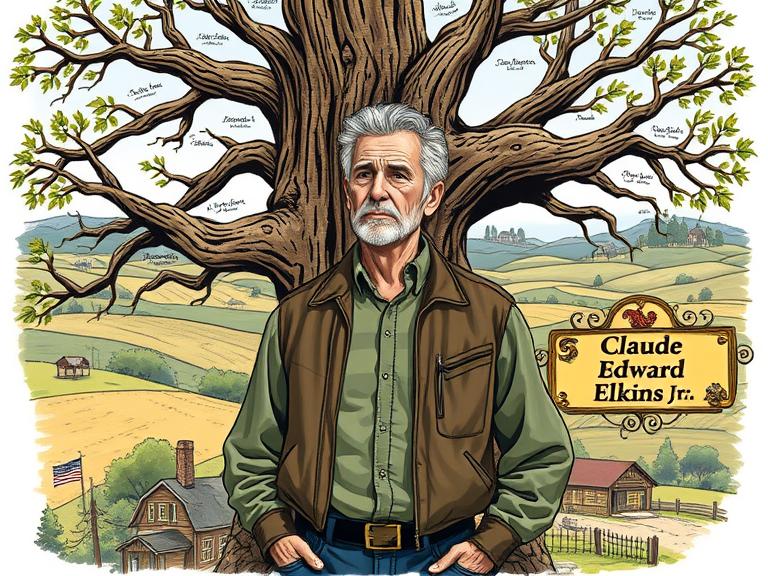When exploring the lives of individuals whose names appear in public records, history, or community memory, we often come across people whose stories are less documented yet valuable in understanding broader human experiences. One such name is Claude Edward Elkins Jr. While not every detail of his personal biography may be readily accessible, the name itself serves as an entry point into discussions about family legacies, historical context, generational identity, and the way individuals shape — and are shaped by — their communities.
Table of Contents
Understanding the Legacy of Names
Names carry powerful symbolism. The addition of “Jr.” to a name, as in Claude Edward Elkins Jr, is not just a formality. It indicates generational continuation and a deep connection to family identity. In many cultures, naming a child after a father is an act of respect, pride, and heritage preservation.
The name “Claude” itself is of Latin origin, often meaning “lame” or “enclosure,” but throughout history it has also carried noble associations. “Edward” is a classic English name meaning “wealthy guardian.” Combined, Claude Edward Elkins Jr reflects both strength and guardianship, qualities that parents might have wished to pass on.
By carrying the suffix “Jr.,” Claude Edward Elkins Jr symbolizes a living bridge between the past and future — someone whose life is both unique and deeply tied to family tradition.
Possible Historical and Cultural Context
While the individual details about Claude Edward Elkins Jr may not be universally documented, his name suggests placement within certain historical or cultural contexts in the United States. The surname “Elkins” is an Anglo-Saxon name, historically linked to England and later adopted by families across America. It is relatively common in Appalachian regions, southern states, and areas where English settlers established early communities.
Individuals bearing the Elkins surname have been connected to:
- Farming and rural life in the Appalachian Mountains.
- Industrial development in coal-mining states like West Virginia and Kentucky.
- Military service, as many from these regions historically enlisted in the armed forces.
- Community-building through churches, schools, and local leadership roles.
Therefore, Claude Edward Elkins Jr may represent a broader narrative: the story of hardworking American families whose efforts were often modest yet deeply meaningful.
Generational Identity and Family Continuity
In families where names are passed down, the “Jr.” suffix creates both opportunity and responsibility. For Claude Edward Elkins Jr, having the same name as his father may have carried expectations of continuing traditions, embodying values, or pursuing similar careers.
This practice often strengthens family bonds. It may also create challenges for individuals who want to establish their independence while honoring the legacy of their name. Exploring the life of Claude Edward Elkins Jr — even in hypothetical or general terms — reminds us of the balance between tradition and individuality.
The Broader Human Significance
Though we may not have personal anecdotes or achievements directly tied to Claude Edward Elkins Jr in widely available records, reflecting on such a figure brings up universal themes:
- Community Contribution – Individuals like Claude often play vital roles in their communities, even if they never appear in national headlines. Teachers, workers, veterans, parents, and neighbors all leave legacies of kindness and service.
- Family Heritage – Carrying on a family name is an act of historical preservation. It ensures that family lines are remembered, respected, and tied together across generations.
- Ordinary Lives, Extraordinary Value – Not every life is documented in detail, but every life has impact. Even without public fame, people like Claude Edward Elkins Jr shape the values, traditions, and progress of their families and local communities.
Lessons from Remembering Individuals Like Claude Edward Elkins Jr
- Value Local Histories: Every community has unsung heroes, people who made quiet but important contributions. Researching names like Claude Edward Elkins Jr helps us rediscover those contributions.
- Preserve Family Stories: Oral traditions, photos, and genealogical records are crucial for keeping legacies alive.
- Celebrate Generational Identity: Passing on names and values from one generation to another creates a sense of unity and belonging.
- Recognize Shared Humanity: Remembering individuals from the past reminds us of the interconnectedness of all lives, regardless of fame or recognition.
Conclusion
The story of Claude Edward Elkins Jr represents more than a single life; it symbolizes the countless individuals who shape families, communities, and local histories in ways often overlooked by mainstream narratives. Through exploring the meaning of his name, potential cultural roots, and generational significance, we see how names carry stories worth remembering.
Whether through family pride, cultural identity, or community ties, individuals like Claude Edward Elkins Jr remind us that every name matters, every life has meaning, and every generation contributes to the unfolding story of humanity.
FAQs About Claude Edward Elkins Jr
Q1: Who was Claude Edward Elkins Jr?
A: While widely available historical or biographical records may not detail his life, his name represents an individual tied to family heritage, generational identity, and cultural history.
Q2: What does the “Jr.” signify in his name?
A: “Jr.” indicates that he was named after his father, continuing a family legacy.
Q3: Why is the surname Elkins significant?
A: The Elkins surname has Anglo-Saxon roots and is historically associated with families in the Appalachian region and other parts of America.
Q4: How can I learn more about people like Claude Edward Elkins Jr?
A: Research local genealogical records, census data, family trees, and community archives to uncover personal stories and contributions.
Q5: Why write about individuals whose stories are less documented?
A: Because every life, regardless of fame, plays a role in shaping communities, traditions, and family heritage.

